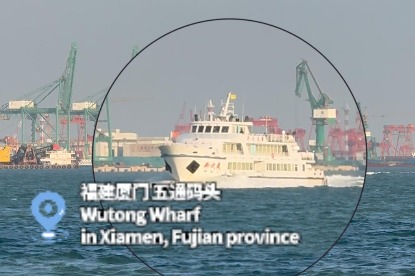Village children find their voices through verse
China Daily | Updated: 2023-10-14 16:41
ZHENGZHOU — One afternoon in late September, little Zhang Haofeng sat down with his school friends and read out a poem he had just written: In the eyes of a bug, /Raindrops form seas, /Big and small, /Wherever they fall, /But me, too, /I see those seas.
It was a rainy day, and the children had been sheltering inside during their lunch break. Eleven-year-old Haofeng's poem was inspired by the rhythm of the raindrops, the first sign of autumn.
He had barely finished reading his poem when his classmate Zai Bingjie eagerly shared his own verse: It is raining. /Ordinary, docile raindrops fall on the ground, /But the naughty ones slip off the wall, /Into my soul.
"You must be a rebellious raindrop," one boy joked, and they burst into laughter.
The children are members of a poetry society established in 2019 in a rural school in Henan province's Xiuwu county, which has about 50 students, all natives of Dananpo, a mountain village that is home to about 1,000 people.
These young poets, however, have written more than 2,000 poems, and their works have been collected into three books since the society was founded four years ago.
"I believe that poetry is a lamp illuminating life," says Liu Xiaojiang, head teacher of Dananpo Primary School. "Poetry writing is a chance for the children to find their voices in literature, and become people who are reconciled with themselves and who love life."
Zhang Yanwen, the poetry society's tutor, is herself an avid reader and writer, but teaching the children to write was a different story. In her first poetry class, she says, the students sat in silence for at least 10 minutes, not knowing what to write. The theme of the class was "an incredible realm".
She ended up telling the children to simply "go out and take note of everything you see". They came back with simple images that were readily transformed into poems.
One of them wrote: I've turned into a cloud, /That chats with the sun during the day, /And frolics with the moon at night.
Another verse goes: The sun is sleepy. /You can tell from its light, /Which dazzles and dims, /From one moment to the next … Dear sun, /Sleep tight tonight.
Touched by these lines, in December 2021, Liu, the head teacher, compiled the poems into a book titled The Hidden Rainbow. Six months later, it was followed by a second collection, called Summer.
As the children observed the world around them, they became more creative and their verse explored more themes, ranging from the four seasons to their families, emotions and aspirations.
One of the young authors was a boy whose father worked in a faraway city, leaving him at home with his mother. He was a boy of few words, but he penned this verse: I miss you, /So I put wings on my heart, /Hoping that I can fly to your side, /Together we climb the mountains, /And play football, /My dad.
The poem was included in the third collection of the children's works, entitled My Dream Is an Ice Cream.
Zhang Yanwen says that many rural children are separated from their parents, who are migrant workers in faraway cities. "Some children, due to a lack of security, are reluctant to open up to their guardians, teachers or peers, but now they have learned to pour out their emotions in writing," she says.
Dananpo village, perched in the Taihang Mountains, is about 600 years old. Until the 1970s, it was rich in coal resources and had a dozen mines that employed over 1,000 people. In the 1980s, the depletion of resources and damage to the environment became evident, and by the end of the 1990s, all the mines had been closed. In 2014, it was listed as a very poor village, with nearly a half of its residents living in poverty. Many adults had to look for jobs in faraway cities, leaving behind their children and elderly parents.
Though the village declared an end to poverty in 2019, regaining prosperity has been an uphill battle. Following the advice of rural development specialists, the village has taken steps to revive the local economy through culture and art. It has renovated its ancient architecture, opened a bookstore, library and art center, and organized exhibitions and music festivals.
The children are also encouraged to explore the world through reading and writing, so that their imaginations are not confined by the craggy mountains.
This year, their three collections of poems have been introduced to their peers in big cities. In June, Haofeng was invited to a literary camp in Tianjin, the only representative from Henan.
Xinhua
























